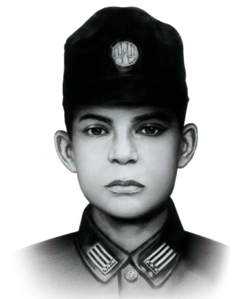Ba Htoo: Difference between revisions
Created the English version of the page. |
No edit summary |
||
| Line 25: | Line 25: | ||
<!-- Inline citations added to your article will automatically display here. See en.wikipedia.org/wiki/WP:REFB for instructions on how to add citations. --> |
<!-- Inline citations added to your article will automatically display here. See en.wikipedia.org/wiki/WP:REFB for instructions on how to add citations. --> |
||
{{reflist}} |
{{reflist}} |
||
{{AfC submission|||ts=20210110210300|u=Sonihao|ns=118}} |
|||
Revision as of 21:03, 10 January 2021
This article, Ba Htoo, has recently been created via the Articles for creation process. Please check to see if the reviewer has accidentally left this template after accepting the draft and take appropriate action as necessary.
Reviewer tools: Inform author |
Ba Htoo | |
|---|---|
ဗထူး | |
 | |
| Born | 1916 |
| Died | 2 June 1945 Aungban, Shan State, Myanmar |
| Cause of death | Malaria |
| Occupation | Colonel in the Burma National Army |
Colonel Ba Htoo (Burmese: ဗထူး; 1916 - 2 June 1945) was an officer in the Burma National Army. He is perhaps most well known for his leadership in driving out Japanese forces from Upper Myanmar during World War II[1]. Having declared war on the Japanese forces on the 8 March 1945, then-Major Ba Htoo took victory in around 20 battles, which alongside a successive campaign launched by General Aung San on 27 March and assaults by the Allied Forces, ultimately resulted in the defeat and expulsion of Japanese forces from Myanmar, and the end of over 100 years of colonial rule[1]. However, as Major Ba Htoo and his forces drove the Japanese from Mandalay and into southern Shan State, he contracted severe malaria and, aged 29-years old, died from the disease in the town of Aungban, Shan State, 2 June 1945[1]. Unbeknownst to Ba Htoo at the time of his death, he had been promoted to the rank of Colonel by General Aung San, as outlined in a letter[1].
A monument commemorating Colonel Ba Htoo and the other Myanmarese soldiers that fell during the war in Upper Myanmar was erected in Aungban 13 days following the Colonel's death[1]. A sports stadium, Bahtoo Memorial Stadium, in Mandalay, Myanmar, and Major Ba Htoo Bridge which connects North Okkalapa and North Dagon, are named in honour of the colonel[2].
References
- ^ a b c d e "On This Day | The Death of Independence Hero Col. Ba Htoo". The Irrawaddy. 2019-06-02. Retrieved 2021-01-10.
- ^ "Major Ba Htoo Bridge - Yangon". wikimapia.org. Retrieved 2021-01-10.
This article, Ba Htoo, has recently been created via the Articles for creation process. Please check to see if the reviewer has accidentally left this template after accepting the draft and take appropriate action as necessary.
Reviewer tools: Inform author |

